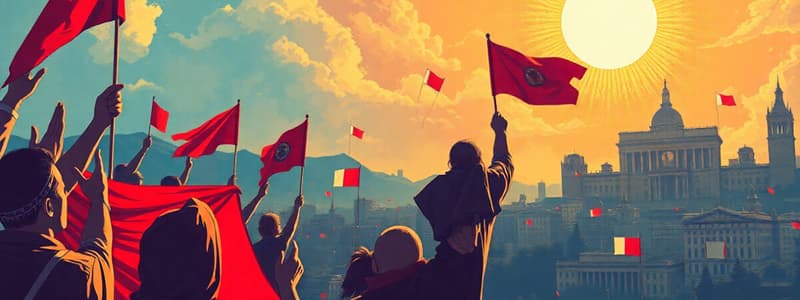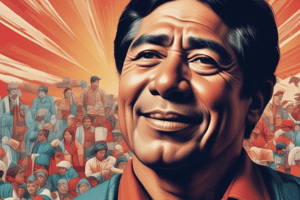Podcast
Questions and Answers
What is one major consequence of strikes in the oil and gas sector in Nigeria?
What is one major consequence of strikes in the oil and gas sector in Nigeria?
- Increased government revenue
- Higher productivity
- Fuel shortages (correct)
- Improved working conditions
Wage increases in Nigeria without corresponding productivity gains can contribute to inflation.
Wage increases in Nigeria without corresponding productivity gains can contribute to inflation.
True (A)
What organization led the nationwide strikes in Nigeria in 2012 due to fuel subsidy removal?
What organization led the nationwide strikes in Nigeria in 2012 due to fuel subsidy removal?
NLC
Frequent strikes in the education sector can lead to lower ________ productivity.
Frequent strikes in the education sector can lead to lower ________ productivity.
Match the following trends with their impacts related to Nigerian trade unions:
Match the following trends with their impacts related to Nigerian trade unions:
Which of the following events indicates the involvement of Nigerian unions in economic reforms?
Which of the following events indicates the involvement of Nigerian unions in economic reforms?
What impact has union activism had on democracy and social justice?
What impact has union activism had on democracy and social justice?
Union protests during military rule had no impact on political change.
Union protests during military rule had no impact on political change.
What economic issue did unions face when negotiating for wages and benefits?
What economic issue did unions face when negotiating for wages and benefits?
Unions argued that privatization and deregulation policies __________ workers and the poor.
Unions argued that privatization and deregulation policies __________ workers and the poor.
Match the impact of union activities with their corresponding examples:
Match the impact of union activities with their corresponding examples:
What was one outcome of union-led strikes in the 1990s under General Sani Abacha's regime?
What was one outcome of union-led strikes in the 1990s under General Sani Abacha's regime?
Collective bargaining always leads to increased productivity.
Collective bargaining always leads to increased productivity.
What was a key reason for union opposition to the removal of fuel subsidies?
What was a key reason for union opposition to the removal of fuel subsidies?
The resistance of unions to some economic reforms has hindered __________ adjustments.
The resistance of unions to some economic reforms has hindered __________ adjustments.
What is a primary effect of public sector strikes in Nigeria?
What is a primary effect of public sector strikes in Nigeria?
Informal workers in Nigeria enjoy the same protections as formal sector workers due to union involvement.
Informal workers in Nigeria enjoy the same protections as formal sector workers due to union involvement.
What percentage of Nigerian workers are employed in the informal sector?
What percentage of Nigerian workers are employed in the informal sector?
Unions often go on strike to demand better ______ and working conditions.
Unions often go on strike to demand better ______ and working conditions.
Match the following sectors with their strike impacts:
Match the following sectors with their strike impacts:
What major issue arises from the absence of unions in the informal sector?
What major issue arises from the absence of unions in the informal sector?
Unions have had no significant impact on Nigeria's economy and labor market.
Unions have had no significant impact on Nigeria's economy and labor market.
What must unions in Nigeria do to remain relevant in the future?
What must unions in Nigeria do to remain relevant in the future?
Inadequate pay and working conditions were reasons for Nigerian doctors' strikes during the ______ pandemic.
Inadequate pay and working conditions were reasons for Nigerian doctors' strikes during the ______ pandemic.
Which of the following is a challenge faced by unions in Nigeria?
Which of the following is a challenge faced by unions in Nigeria?
Study Notes
Union Activism and Democracy
- Unions have historically played a role in pro-democracy movements, particularly during military rule in Nigeria.
- Unions have protested against government policies like austerity measures, which can impact economic stability.
Union Impact on the Economy
- Union activism can promote social justice and democracy but also contribute to political instability.
- Protests and confrontations can lead to uncertainty, deter investment, and weaken business confidence.
Examples
- In the 1990s, unions led strikes for democratic rule under General Sani Abacha's regime.
- This success came at the cost of economic instability, deterring investment and slowing economic growth.
Collective Bargaining and Productivity
- Nigerian unions negotiate for wages and benefits, but there's a disconnect between these increases and productivity in many industries.
- Wage hikes without productivity gains raise production costs, reducing business competitiveness and leading to lower economic growth and fewer jobs.
- In the public sector, wage increases have not been matched by productivity gains, leading to inefficiencies and bloated wage bills, diverting resources from essential services and development.
Union Involvement in Economic Reforms
- Unions have historically opposed some economic reforms, particularly those related to privatization, deregulation, and subsidy removal.
- While union resistance has delayed some reforms, it has also hindered economic adjustments.
- The long-standing fuel subsidies, which unions have defended, have contributed to fiscal deficits and reduced government spending on infrastructure and social services.
The Informal Sector and Union Challenges
- A significant portion of Nigeria's workforce is in the informal sector which lacks unions.
- Unions struggle to organize informal workers, leading to unequal labor market outcomes.
- Formal sector workers benefit from union protection, while informal workers often lack wages, benefits, and legal protection.
- Over 60% of Nigerian workers are in the informal sector, resulting in widespread issues like low wages and poor conditions.
Impact on Public Services
- Public sector strikes, particularly in education, healthcare, and transportation, are frequent.
- These strikes often aim to secure better pay, working conditions, and infrastructure improvements.
- Strikes can have major economic and social consequences.
- Education strikes disrupt academic schedules, reducing the supply of skilled workers.
- Healthcare strikes negatively impact the population's well-being and productivity.
Public Service Strikes
- In 2020, Nigerian doctors went on strike multiple times due to inadequate pay and working conditions, further straining the healthcare system during the COVID-19 pandemic.
Balancing Interests
- Trade unions have shaped Nigeria's labor market, politics, and economy.
- While unions have improved wages and defended worker rights, they have also caused economic disruptions.
Complex Challenges
- Balancing worker interests with economic growth is a major challenge.
- Productivity improvements and fiscal sustainability are also important.
Future Adaptation
- Unions must adapt to the rise of the informal sector.
- They must also adapt to global competition and technological advancements.
- Nigerian trade unions have played a significant role in shaping the country's economy.
- Their actions have direct and indirect impacts, such as disruptions to economic activity caused by strikes in sectors like oil and gas, education, health, and transportation.
Labor Strikes and Economic Disruptions
- Strikes are a common tactic for Nigerian unions, especially in key sectors.
- Strikes can lead to revenue losses, fuel shortages, trade disruptions, prolonged school terms, lower worker productivity, and harm to education quality.
- In 2012, nationwide strikes over fuel subsidy removal cost Nigeria billions in lost productivity.
Wage Negotiations and Inflationary Pressures
- Unions like the NLC and TUC are actively involved in wage negotiations to ensure fair compensation and working conditions.
- Wage increases can lead to inflation if not matched by productivity gains.
- Higher costs for businesses can lead to higher prices for consumers.
- Increased government wages can strain public finances, leading to larger budget deficits or cuts in other areas.
Political Activism and Economic Stability
- Nigerian labor unions have engaged in social and political activism.
Studying That Suits You
Use AI to generate personalized quizzes and flashcards to suit your learning preferences.
Related Documents
Description
Explore the complex relationship between union activism and democracy in Nigeria. This quiz delves into how unions have influenced political movements and economic conditions, highlighting historical examples and the effects of collective bargaining. Test your knowledge on the pivotal role of unions in shaping Nigeria's socio-economic landscape.




